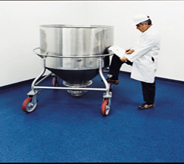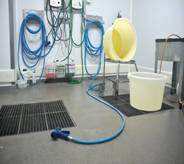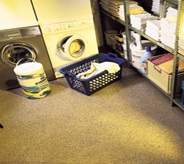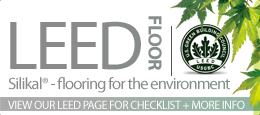Chemical Resistant Flooring
Silikal® Nationwide Flooring- 888.830.1404
-

For over 55 years Silikal’s chemical resistant flooring has been able to withstand all manner of chemicals, including some of the newer ones such as jet fuel!
Enlarge -

Flooring that is chemical resistant will have been laboratory tested against harm to your choice of flooring.
Enlarge -

Chemical resistant floors are an absolutely necessity for laboratories, or any industry that utilizes acids for example.
Enlarge
There are quite a few products out there for chemical resistant flooring. For instance there are some alicyclic compounds that are chemical resistant, and those may be found in various epoxies that can be utilized as flooring. The problem with many of them is that they contain VOCs, which are volatile organic compounds. These compounds may cause allergy and asthma triggers depending on the amount of VOCs in them.
Now you should know that for instance there are 100% epoxies being sold for chemical resistant flooring that are 100% solids. What that means to you is that when the product dries, that’s what is actually left on the floor, 100% solid. You may find that some epoxies are 30-40 or 50% epoxies, and thus their chemical resistance may not be as much as you’d expect because what the numbers reflect is the thickness of the epoxy in question.
But, is thickness the only factor in deciding on chemical resistant flooring? Actually no, even if you find one that has no VOCs, it may not be enough. This is because some of the lower quality water based epoxies will need to be redone in one or two years following initial installation. If they wear out that quickly, how quickly do you think the chemical resistance is? Correct, it goes down to nil.
What you desire is actually flooring that contains cycloaliphatic curatives in the formulation. That means that the hardener or curing agent is blended in such a way as to create better chemical resistance.
The problem with epoxies is the preparation that must be undergone first on the floor. For instance if there is something else already on the floor, some sort of coating, then you will find that the floor must first be sanded or even diamond ground down to the actual cement. This process may take days to perform depending on the size of the floor and the depth of the previous coating. A very strong epoxy, the ones that are 100% solid, will still wear out in approximately 20 years. At that point it must be first removed as stated above and you start over again.
Now there is an answer to the question regarding chemical resistant flooring. The answer lies in using Silikal. First it has absolutely no VOCs, thus it provides zero off-gassing, which is very important today with regard to sustainability and keeping everything “green.” In fact Silikal contributes toward your LEED certification. Silikal is a resinous flooring system that can actually be installed on your floor today, and be ready for any use in one hour! It dries so hard, that it is totally chemical resistant, but will never need to be redone. The bond is that total, that secure.





 COLOR MIXING DESIGN TOOL
COLOR MIXING DESIGN TOOL
 COLOR CHARTS + BLENDS
COLOR CHARTS + BLENDS
 SAMPLE REQUEST
SAMPLE REQUEST

 Silikal®is manufactured + sold in conformity to
Silikal®is manufactured + sold in conformity to
 Avoid Costly Downtime
Avoid Costly Downtime